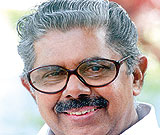 |
Overseas Indian centre to be set up |
Overseas Indian Affairs Minister Vayalar Ravi has announced plans to create a special centre to attract investments from overseas Indians and facilitate the creation of a global Indian consortium.
The consortium would be expected to work with apex trade bodies, states of India and various associations of overseas Indians, Ravi said, while inaugurating India Calling 2006, a India-UK business summit held in London.
He said the plans were likely to be finalised before the next Pravasi Bharatiya Divas, scheduled to be held on January 9 in New Delhi.
The Overseas Investment Centre is envisaged as a single point contact at the national and state level and will provide investment advisory services on taxation, legal requirements, information on capital market investment and opportunities to invest in the real estate, according to G. Gurcharan, joint secretary in the ministry.
London Mayor Ken Livingstone said his administration would open offices in Mumbai and New Delhi. He said he saw the future of India’s economy as staggering for the future of humanity while adding that he would not be surprised if India took over a large share of the British economy. |
|
 |
Tables turned on world’s largest Indian restaurant |
The world’s reputedly largest Indian restaurant, which could seat 860 diners at a time, located in a 19th century chapel in West Yorkshire, in UK has been take over by the Bank of India over mortgage default.
The Cleckheaton-based Aakash Restaurant has been in the news since it opened in 2001. It hosted a royal visit by the Duke of Kent in 2001 and was featured in BBC2’s Restoration series.
Dewsbury-resident Mohammad Iqbal Tabassum, the owner, spent two years and £1.7 million to convert the former Providence Place Chapel into Aakash Restaurant. He is now banned from entering the property.
Ward councillor Ann Raistrick told the local media: “It is a great disappointment and a big blow for Tabassum. He put a huge amount of effort and energy into saving a listed building and trying to make a go of it.”
|
|
|

|
South Africa and India
|
India, South Africa sign Tshwane Declaration
It is designed to give substance and content to the bilateral relationship; addresses concerns over terrorism
|
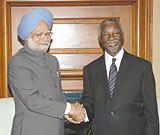 India and South Africa reaffirmed their strategic partnership by signing a 25-point joint document, called The Tshwane Declaration, designed to give substance and content to their relationship. Apart from giving aid and comfort to India in its effort to break out of the international nuclear apartheid, the Declaration addresses Indian concerns on terrorism. India and South Africa reaffirmed their strategic partnership by signing a 25-point joint document, called The Tshwane Declaration, designed to give substance and content to their relationship. Apart from giving aid and comfort to India in its effort to break out of the international nuclear apartheid, the Declaration addresses Indian concerns on terrorism.
Making a reference to the “barbaric attacks” of July 11, 2006 in Mumbai, the Declaration calls for “the early adoption of a Comprehensive Convention on International Terrorism (CCIT) in the U.N. General Assembly.” The CCIT is a New Delhi initiative. Addressing the media after the signing ceremony at the magnificent Union Buildings housing the offices of the Presidency, South African President Thabo Mbeki stressed the usefulness of global cooperation in meeting the challenge of terrorism. He said that by sharing information, intelligence and experience, the two countries could empower themselves against terrorism. Pointing out that “those who are involved in the Mumbai blasts might have flown in from here,” Mbeki said countries needed to cooperate and learn from one another.
The Declaration also underlines and applauds the common approach India and South Africa had taken in the WTO negotiations.
“The globalisation process must address, not perpetuate or aggravate, the existing inequalities,” the two leaders noted. They “deeply regretted” that the Doha negotiations had been suspended after a clash between “the interests of corporate agriculture and large industrial enterprises of the developed countries” and the interests of “small and the vulnerable producers” of the developing countries.
The two leaders called for reduction in “all forms of trade-distorting domestic support provided by” industrialised countries and demanded the “establishment of a fair and market-oriented trading system in the global agricultural sector”.
The Declaration also calls upon the private sectors in the two countries to “treble the volume of bilateral trade by 2010”. The two leaders welcomed the third meeting of the India-South Africa CEOs’ Forum, which took place in Johannesburg. In the defence field, the Declaration calls for closer cooperation, “including the possibility of joint research and development.” This means a desire to move beyond the present buyer-and-supplier relationship.
Health care
The Declaration commits support for the companies of both nations in the health services area and promises encouragement to them “to work jointly to provide affordable health care to nationals of both countries as well as in third countries.” The Indian officials see immense potential in this area of cooperation. Urgent attention has been promised to cooperation in the area of Information and Communication Technologies, as part of a larger Indian commitment to help South Africa acquire skills in running institutions. Singh promised to increase the “Indian Technical and Economic Cooperation” programme slots allocated to South Africa from 55 to 100. Of these, 50 slots would be earmarked for the Joint Priority Skills Acquisition Initiative.
Tourism
The Declaration talks of enhanced cooperation in the tourism sector, as also in fleshing out the proposed partnership in Pan African e-Network and the World Knowledge Platform.
The two leaders also re-affirmed the need for an expansion of the Security Council in a manner as to “include developing countries from Africa, Asia and Latin America in both permanent and non-permanent categories.”
|
|
|
|
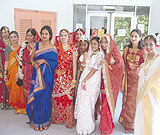 |
Help at hand for abandoned and abused NRI brides |
As the government grapples with the issue of fraudulent NRI marriages and abuse of brides, Silicon Valley-based lawyer Anu Peshawaria has launched a non-profit legal aid organisation SevA in California to address the issue.
It will offer legal aid and advice as women are more vulnerable and lack of knowledge of immigration rules can put them at a disadvantage over visa regulations, she said in New Delhi.
For NRI marriages she recommends the fiancee visa, under the K category, for young girls from India which will give them a chance to go to the US to get to know the groom and his family. At that stage the wedding can be called off if there is any problem, says Peshawaria, president of Immigration & Business Services, her own law firm.
She says women married to IT experts should ask their spouses to opt for the L1 visa rather than H-1B. While the dependent H4 visa for spouse and unmarried children under 21, of an H visa holder, doesn’t allow the holders to take up employment in the US; the L2 visa holders can work or study legally, she says.
As for H4 visa holders, Ms Peshawaria feels that the best option is to find freelance assignments in India on the Internet. She has been actively involved in lobbying efforts for changes in immigration laws that will make it easier for spouses on dependent work permit visas to remain in the US even after they are divorced.
“Currently, the law is very difficult for women who are abandoned and divorced as they have to immediately leave the US.” |
|
| NRI among 3 Indians to be awarded Canada-Hope scholarships |
Three Indian researchers have received the prestigious Canada-Hope scholarships for their study on healthy aging, organ damage and stroke research.
Sabu Aliyar from the Centre for Development Studies received the scholarship for his ongoing research on healthy aging while Denis Xavier, of the Bangalore-based St John’s Academy for Health Sciences, won it for his study on different types of stroke.
Biju George, from the Health Action by People, who is pursuing his research at the University of Western Ontario to identify biomarkers for early detection of organ damage, also received the scholarship, the Canadian High Commission in New Delhi said. The Canadian Institutes of Health Research and Sanofi-Aventis Canada Inc support the scholarship. |
|
 |
AUSTRALIA AND INDIA |
| Aussie students to intern in NIIT Tech |
With Australia facing a major skills shortage and a shortfall in IT graduates, India’s NIIT Technologies has signed a deal to get Australian
stude nts enrolled in their programmes in Melbourne. The agreement will see students from Melbourne’s Box Hill Technical and Further Education
(TAFE) do four-month internship programmes at NIIT Technologies’ Australian projects. nts enrolled in their programmes in Melbourne. The agreement will see students from Melbourne’s Box Hill Technical and Further Education
(TAFE) do four-month internship programmes at NIIT Technologies’ Australian projects.
NIIT’s Australia country head John Price said with Australia
facing a major skills shortage and a shortfall in IT graduates, the company’s partnership with Box Hill will “help students bring their course material alive with experience at the coal face of the IT industry”.”The programme is also importantly aimed at
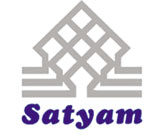 helping to reduce the exodus of IT graduates into other business sectors,” he was quoted as saying. helping to reduce the exodus of IT graduates into other business sectors,” he was quoted as saying.
NIIT is the latest Indian company to get into headhunting students in Australia. Last year Satyam Computer Services entered into a deal with Victoria University following which students from the university got to work at the company’s Indian and Chinese centres. Tata Consultancy Services has a similar graduate recruitment scheme covering Australia, China, Singapore and the Philippines. |
|
Indian origin academician made Aussie varsity’s cultural advisor
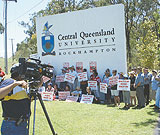 Australia’s Central Queensland University (CQU) has appointed Martand Joshi, former honorary consul of India in Melbourne, as its international cultural advisor. “Dr Joshi’s experience as a diplomat along with his teaching and studies around the world make him the ideal person to raise cultural awareness among CQU staff and students,” a university press release quoted CQU Melbourne campus director Darryl Stewart as saying. Australia’s Central Queensland University (CQU) has appointed Martand Joshi, former honorary consul of India in Melbourne, as its international cultural advisor. “Dr Joshi’s experience as a diplomat along with his teaching and studies around the world make him the ideal person to raise cultural awareness among CQU staff and students,” a university press release quoted CQU Melbourne campus director Darryl Stewart as saying.
CQU is Australia’s largest publicly funded regional university. While the main campus of CQU is located in Queensland, it also has campuses in Sydney, Melbourne, Brisbane and the Gold Coast and an overseas campus in Fiji. Joshi’s appointment will base him in the Sydney and Melbourne campuses. “More than 8,000 students who study at CQU Melbourne and Sydney will benefit directly from Dr. Joshi’s experience,” Stewart said. |
|
Indian origin lawyer sparks major diplomatic row in Australia
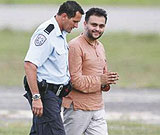 A major three-way diplomatic spat is brewing in Australia over an Indian origin lawyer who had jumped bail in Papua New Guinea last week. Julian Moti, 41, the newly appointed attorney-general of the Pacific nation of Solomon Is, was arrested by the Papua New Guinea police from the airport in the country’s capital Port Moresby. A major three-way diplomatic spat is brewing in Australia over an Indian origin lawyer who had jumped bail in Papua New Guinea last week. Julian Moti, 41, the newly appointed attorney-general of the Pacific nation of Solomon Is, was arrested by the Papua New Guinea police from the airport in the country’s capital Port Moresby.
Moti was granted bail but did not appear in court. He was found missing from the hotel in Port Moresby where he was put up and is now believed to be under diplomatic protection at the Solomon Is high commission in Papua New Guinea.
Australia has sought the extradition of Moti, an Australian citizen, from Papua New Guinea on an earlier charge of child sex in another Pacific nation, Vanuatu.
This had soured relations between Australia and the Solomon Is with PM Manasseh Sogavare of Solomon Is stating that Australia’s action “is a serious violation of the sovereignty of the Solomon Islands and a disregard of established institutions”.
Now, according to reports, the case has got a fresh twist with Papua New Guinea Prime Minister Sir Michael Somare too siding with the Solomon Islands. |
|